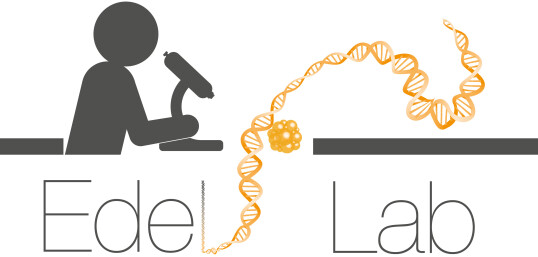Summary
In order to find out more about my research activities or to find out about openings, please visit my group website: http://www3.imperial.ac.uk/edelgroup
Joshua's research publications can be found at the tab above, or on GoogleScholar
Research Interests
Analytical Sensors plays a crucial role in today’s highly demanding exploration and development of new detection strategies. Whether it be medicine, biochemistry, bioengineering, or analytical chemistry the goals are essentially the same: 1) improve selectivity & sensitivity, 2) maximize throughput, 3) and reduce the instrumental footprint. In order to address these key challenges, the analytical community has borrowed technologies and design philosophies which has been used by the semiconductor industry over the past 20 years. By doing so, key technological advances have been made which include the miniaturization of sensors and signal processing components which allows for the efficient detection of nanoscale object. One can imagine that by decreasing the dimensions of a sensor to a scale similar to that of a nanoscale object, the ultimate in sensitivity can potentially be achieved - the detection of single molecules.
Current research activities taking place in the group include:
- Single molecule biological screening using electrical and optical methods
- Early stage diagnostics including cancer and neurodegenerative disorders
- Single cell screening
- Development of novel DNA sequencing and nanopore platforms
- Electrovariable plasmonics

Biography
Prof. Joshua Edel received his PhD on the development of single molecule detection within microfluidic systems at Imperial College London in 2003. He then performed postdoctoral research in nanobiotechnology at Cornell University within the School of Applied and Engineering Physics. In 2005 he was awarded a research fellowship in single molecule biophysics at the Rowland Institute at Harvard University. In July 2006 he joined Imperial College London within the Department of Chemistry and Institute of Biomedical Engineering as a lecturer. Joshua is currently a Professor in the Department of Chemistry and in 2011 he was awarded a prestigious ERC Starting Grant on “Nanoporous Membranes for High Throughput Rare Event Bioanalysis” and in 2016 he was awarded an ERC Consolidator Grant related to the development of selective single molecule biosensors.
Selected Publications
Journal Articles
Liu Y, Wang X, Campolo G, et al., 2023, Single-molecule detection of α-Synuclein oligomers in Parkinson's disease patients using nanopores, ACS Nano, Vol:17, ISSN:1936-0851, Pages:22999-23009
Kwan Z, Paulose Nadappuram B, Leung MM, et al., 2023, Microtubule-mediated regulation of β2AR translation and function in failing hearts, Circulation Research, Vol:133, ISSN:0009-7330, Pages:944-958
Wang X, Thomas T-M, Ren R, et al., 2023, Nanopore detection using supercharged polypeptide molecular carriers, Journal of the American Chemical Society, Vol:145, ISSN:0002-7863, Pages:6371-6382
Tang L, Yi L, Jiang T, et al., 2022, Measuring conductance switching in single proteins using quantum tunneling, Science Advances, Vol:8, ISSN:2375-2548, Pages:1-8
Ren R, Sun M, Goel P, et al., 2021, Single-molecule binding assay using nanopores and dimeric NP conjugates, Advanced Materials, Vol:33, ISSN:0935-9648
Cai S, Pataillot-Meakin T, Shibakawa A, et al., 2021, Single-molecule amplification-free multiplexed detection of circulating microRNA cancer biomarkers from serum, Nature Communications, Vol:12, ISSN:2041-1723
Fried JP, Swett JL, Nadappuram BP, et al., 2021, In situ solid-state nanopore fabrication., Chemical Society Reviews, ISSN:0306-0012
Tang L, Paulose Nadappuram B, Cadinu P, et al., 2021, Combined quantum tunnelling and dielectrophoretic trapping for molecular analysis at ultra-low analyte concentrations, Nature Communications, Vol:12, ISSN:2041-1723, Pages:1-8
Xue L, Yamazaki H, Ren R, et al., 2020, Solid-state nanopore sensors, Nature Reviews Materials, Vol:5, ISSN:2058-8437, Pages:931-951
Ma Y, Sikdar D, Fedosyuk A, et al., 2020, Electrotunable nanoplasmonics for amplified surface enhanced Raman spectroscopy, ACS Nano, Vol:14, ISSN:1936-0851, Pages:328-336
Zhang Y, Takahashi Y, Hong SP, et al., 2019, High-resolution label-free 3D mapping of extracellular pH of single living cells, Nature Communications, Vol:10, ISSN:2041-1723, Pages:1-9
Cai S, Sze YYJ, Ivanov A, et al., 2019, Small molecule electro-optical binding assay using nanopores, Nature Communications, Vol:10, ISSN:2041-1723, Pages:1-9
Paulose Nadappuram B, Cadinu P, Barik A, et al., 2019, Nanoscale tweezers for single-cell biopsies, Nature Nanotechnology, Vol:14, ISSN:1748-3387, Pages:80-88
Al Sulaiman D, Cadinu P, Ivanov AP, et al., 2018, Chemically modified hydrogel-filled nanopores: a tunable platform for single-molecule sensing, Nano Letters, Vol:18, ISSN:1530-6984, Pages:6084-6093
Cadinu P, Campolo G, Pud S, et al., 2018, Double barrel nanopores as a new tool for controlling single-molecule transport, Nano Letters, Vol:18, ISSN:1530-6984, Pages:2738-2745
Barik A, Zhang Y, Grassi R, et al., 2017, Graphene-edge dielectrophoretic tweezers for trapping of biomolecules, Nature Communications, Vol:8, ISSN:2041-1723, Pages:1-9
Sze JYY, Ivanov AP, Cass AEG, et al., 2017, Single molecule multiplexed nanopore protein screening in human serum using aptamer modified DNA carriers, Nature Communications, Vol:8, ISSN:2041-1723, Pages:1-10
Montelongo Y, Sikdar D, Ma Y, et al., 2017, Electrotunable nanoplasmonic liquid mirror., Nature Materials, Vol:16, ISSN:1476-1122, Pages:1127-1135
Cadinu P, Cadinu P, Paulose Nadappuram B, et al., 2017, Single Molecule Trapping and Sensing Using Dual Nanopores Separated by a Zeptoliter Nanobridge., Nano Letters, Vol:17, ISSN:1530-6984, Pages:6376-6384
Ren R, Zhang Y, Paulose Nadappuram B, et al., 2017, Nanopore extended field effect transistor for selective single molecule biosensing, Nature Communications, Vol:8, ISSN:2041-1723, Pages:1-9

